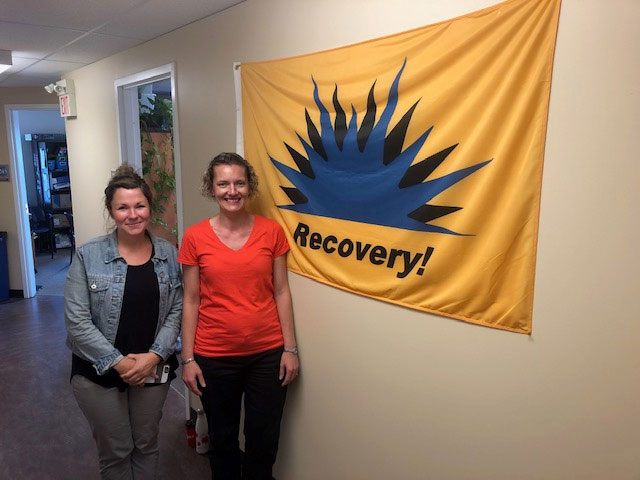A story of hope and recovery with NHH’s Assertive Community Treatment Team for Mental Illness Awareness Week
Mental Illness Awareness Week (MIAW) began October 6th, and Northumberland Hills Hospital (NHH)—through the story of one very inspiring client—is taking the opportunity to highlight information on the mental health services available in our region, and demonstrate the impact of one team in-particular, NHH’s Assertive Community Treatment (ACT) Team.

There was a time, a decade ago, when Noah* would not have been able to sit down and have a coffee and a chat around a table with friends.
Mental illness had interrupted Noah’s life. He had turned away from himself, his job, and from family and friends who cared about him. He was scared and alone, obsessed with the colours black and white, and convinced that he had the power to change the colours in the world… and if he didn’t, or couldn’t, harm would come to him, and to others.
“I was never on drugs,” he explained, “I went to school. I had a job and a license. I had a lot of friends and my life was on a good track.”
While there were some signs in high school, Noah was in his mid-twenties, working, and living with his parents, when his mental illness really presented itself. His obsession with colour, and then numbers, was all he could think about, and in what he recounts as one of his worst moments, Noah found himself in a farmer’s field near his parents’ home in Roseneath. And he did not want to live.
Diagnosed with schizoaffective disorder, Noah has persevered in the face of his condition, and found the help he needed. After multiple hospitalizations, a lot of work on his part, and years of support from his parents, neighbours, outreach community mental health workers, and psychiatrists, he is ready to share his story for Mental Illness Awareness Week.
Today Noah lives independently, and even volunteers to help others who are on mental illness journeys of their own. He shares his story this month as a message of hope for the one in five Canadians dealing with mental illness today. Though his journey to recovery is ongoing, Noah is very grateful for the circle of supports that helped him to get to the good place he’s in today—especially his friends in the ACT Team.
One of 80 clients from across Northumberland County served today by NHH’s ACT Team, Noah, now 37, is a strong advocate for the power ACT had to help him when he needed it most.
A small team, ACT is comprised of a variety of clinicians including a case manager, nurses, a social worker, an occupational therapist, an addiction specialist, a vocational specialist and a psychiatrist.
Based out of NHH’s Elgin Street offices, and overseen by Jennifer Cox, Integrated Director of Community Mental Health who links care between Ontario Shores Centre for Mental Health Services and both Northumberland hospitals, most of NHH’s ACT Team members actually spend little of their time in the office, and the majority supporting people living with severe mental illness in the community. Clients range in age from 18 to 65, and with the intensive support most are able to maintain their goal of staying out of hospital, and out of jail.
“The majority of our clients are living with a diagnosis of severe bipolar disorder or schizophrenia,” explains Julia Smith, NHH’s ACT Team lead. “We are available to them 7 days per week/365 days a year, using a model that goes to where they are, taking care to the client, be that in their own home, with family, in shelter or on the street.”
Many of NHH’s ACT clients receive daily visits, sometimes twice a day—others are seen weekly. “Our aim is to fit into the client’s life, as required, so the support is ongoing. Our ACT services are not time limited and we work hard to support the whole person, as their needs dictate, including mental but also physical and social needs, such as support with activities of daily living like cooking, eating and personal care, housing assistance, help connecting with other community resources, or simply helping with transportation to get to and from a doctor appointment…whatever the need may be, we’re there.”
When an ACT client is in crisis, and requires hospitalization, the first stop is the NHH Emergency Department (ED). ACT staff accompany the client to the ED, and liaise directly with Laurie Gallagher, NHH’s Mental Health Crisis Clinician. Once in the ED, Laurie becomes the lead advocate, and makes sure that they get all the support they need. Likewise, Laurie is a link back to the ACT team, to keep them informed of the client’s next steps, and helps to work together with the team until the client is discharged back into the community or transferred to a psychiatric hospital. “The relationship between community support and emergency support is key to our ACT clients’ wellbeing,” explains Julia. “It’s a whole system approach.”
View/download the news release pdf
